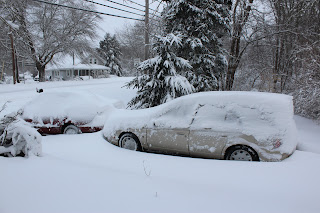_
The boys aren't very demanding when it comes to their birthdays. At least they know better than to trust us to buy them their presents. They're at the age where they'd prefer cash, and their aunts and grandparents usually supply them some. Other than that - they're content with some cake or fresh doughnuts and a day's worth of slightly elevated status.
Porter turned fifteen yesterday and I took him and Jose and Nico bowling. (Our actual birthday present was to shell out for his 9th grade school trip -- 10 days traveling, studying the geology and biology and culture of Hawaii. He and his classmates will leave in the wee hours of Monday morning, damn them.)
On the rare occasions that we bowl we usually do it at Westerly's little pizza-and-beer, working class lanes, Alley Katz, but for a special occasion we chose somewhere more alien and disorienting. So in the drizzling day I drove the 15 miles westward to the Foxwoods Casino, where the High Rollers alley is.
Foxwoods rises jarringly out of the woods of eastern Connecticut, a strange, out of place island of gambling and commerce. Entering the hotel-casino complex I feel like I'm an odd, harmless virus within some bustling alien organism.
While we waited for a lane to clear (the brusque girls at the counter would text us when we reached the edge of the waiting list) we ate burgers at a restaurant aggressively decorated with mass produced nostalgia-clutter -- as though, after the clamor and glare of the slot machines, no one was prepared to face more than a few inches of bare wall. The girl that Porter wanted to see found us there, and the five us us strolled the long interstices between the gaming rooms, theaters and concert halls, these long shopping-mall hallways.
Porter and the girl were busy catching up (the casino is the half-way point between their towns and they don't see each other much), but it's hard to imagine three people less interested in window shopping than Nico, Jose and I. Normally, I'd enjoy people watching, but most of the demographics interesting to me -- like teenagers, families with kids, immigrants and the fashionably hip -- were not here. Instead it was older, married couples, nouveau riche foreigners, tourists up from New Jersey and suburban New York, the occasional pack of office drones -- the kinds of people who think it's a fun idea to trek to a gambling island in the woods of eastern Connecticut.
But eventually lane 16 freed up and we got in to bowl our games and eat their fancy pizza. And Porter managed to bowl just a bit better than the girl, though she pressed him in the second game. And Jose managed to bowl just a bit better than Nico and then Nico bowled just a bit better than Jose, (who was then quick to point out that his lack of talent at bowling is a small thing compared to his superior skills in soccer and basketball). And I bowled better than all of them, which was only fair.
And then, the girl's mother had collected her, and the rest of us were driving back through the rainy night, toward home.
_










